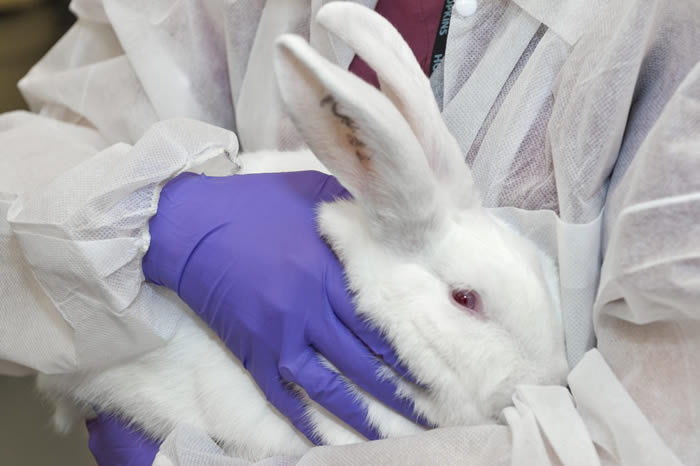Post-DVM Training in Lab Animal Medicine

Training of veterinary scientists in comparative medicine and pathology began in the mid-1960s at Johns Hopkins University School of Medicine. The Dept of Molecular and Comparative Pathobiology (formerly Comparative Medicine) obtained one of the first NIH Training Grants for postgraduate training of veterinarians and has been funded continuously for over 35 years. Our combination of intensive training in Laboratory Animal Medicine and research mentored by outstanding scientists has proven highly successful. We have now trained more than 110 veterinarians; many are now department chairs and leaders in academia and industry worldwide.
Current department faculty includes veterinarians with ACVP and/or ACLAM board certification plus additional PhD faculty pursuing basic and translational research. Research interests include virology, parasitology, neuropathology, immunology, cardiovascular disease, proteomics, RNA biology, rodent phenotyping, and laboratory animal medicine. Our postdoctoral fellows have a high pass rate on the Laboratory Animal Medicine (ACLAM) board examination and graduates enjoy satisfying careers at universities and other institutes of higher learning, as well as in industry and government.
In our Laboratory Animal Medicine training program, we offer two types of Postdoctoral Fellowships in Laboratory Animal Medicine. Both programs start July 1:
1. Research Emphasis, 4 year program, offered each year (variable number of positions)
2. Clinical Emphasis, 3 year program, offered each year (variable number of positions)
Research Emphasis Postdoctoral Fellowship in Laboratory Animal Medicine
This training is comparable to residency/PhD programs offered at veterinary schools and is distinguished by the broader research opportunities afforded by a large medical institution and the opportunity to pursue a PhD in a JHU graduate program. This is a 2-part program: three years of research training funded by the National Institutes of Health preceded by one year of pathology training funded by Research Animal Resources. The program prepares trainees for certification by the American College of Laboratory Animal Medicine (ACLAM).
During the first year the postdoctoral fellows gain comprehensive experience in clinical care and diagnostic procedures through rotations in surgical support and post-operative care, pathology, rodent program management, and primate breeding colony medicine and management. Didactic training consists of weekly lectures, pathology slide review and seminars plus peer-mentored boards study, journal and regulations review, and monthly seminars on behavior.
In the years 2 to 4, emphasis is on basic or translational research supervised by Molecular Comparative Pathobiology faculty or other faculty from more than 30 academic departments forming Johns Hopkins Medicine. During those three years, trainees also have the option to pursue a PhD through concurrent enrollment in any of several world-class graduate programs in the School of Medicine designed to provide closely mentored guidance in the process of conducting research. Laboratory animal medicine training continues throughout the program with weekly slide conferences, seminars, journal clubs, and other courses in preparation for ACLAM certification.
Years 2-4 of this program are generously supported by NIH T32 OD011089.
For more information, view our position announcement or contact our Academic Program Coordinator, Momina Malik, at 443-287-2953 or email her at dvmtraining@jhmi.edu.
Clinical Emphasis Postdoctoral Fellowship in Laboratory Animal Medicine
Johns Hopkins University offers a three-year postdoctoral fellowship in Laboratory Animal Medicine (LAM). The program is funded by Research Animal Resources and runs in tandem with the NIH-funded postdoctoral training program. This program has a strong clinical emphasis: trainees are given broad exposure and responsibilities in our clinical and pathology programs. The program provides outstanding clinical training in laboratory animal medicine as well as scholarly activities to fulfill the requirements for certification by the American College of Laboratory Animal Medicine (ACLAM).
Emphasis of the program is on acquiring competence in clinical care, pathology, and diagnostic procedures in laboratory animals through rotations in large animal surgical support and post-operative care, old and new world primate medicine and breeding colony management, and rodent program management. Our trainees have extraordinary diagnostic and surgical laboratories at their disposal (i.e. interventional radiology, small animal imaging core, rodent microsurgery and phenotyping core, minimally invasive surgical training facilities (MISTC), and advanced diagnosis through a state-of-the-art hospital facility). The veterinary team provides clinical and surgical services, animal handling and technique training, and protocol consultation to research investigators throughout the Johns Hopkins University. In the later years, residents continue their clinical experience and spend majority of their time in collaborative research projects with faculty tailored to the trainee’s interests throughout the institution for one or more research publications. During the final year, residents work closely with departmental faculty (five ACLAM Diplomates), regional study groups (i.e. Army programs), and LAM postdoctoral fellows in preparation for ACLAM board examination.
For more information, view our position announcement or contact our Academic Program Coordinator, Momina Malik, at 443-287-2953 or email us at dvmtraining@jhmi.edu.
Current Post-Doctoral Fellows:
Jacqueline Brockhurst (Research Emphasis)
Natalie Castell (Research Emphasis)
Rachel Vistein (Research Emphasis)
Isabel Jimenez (Research Emphasis)
Mallory Brown (Clinical Emphasis)
Michael Wallis (Clinical Emphasis)
Alex Bailey (Clinical Emphasis)
Ryan Navarro (Clinical Emphasis)
Alexis Roach (Clinical Emphasis)
